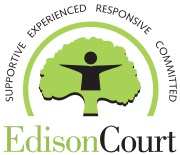Working with court -mandated teens is hard! Many programs rely on behavioural approaches that are
designed to compel, rather than inspire, change or on purely physical techniques to control client
behavior. But these approaches fail to respect the dignity, individuality, and humanity of young people
and don’t necessarily lead to lasting change. This is especially important when considering our population
of young men with histories of problematic sexual behaviors. This kind of change does not tend to last
because it depends upon environmental factors that disappear once treatment is over. We seek internally
motivated change—the kind that lasts a lifetime. The residential programs of Edison Court (Mathom
House, Easton Manor, and PATHS) operate from the understanding that healing must come from the
‘inside out’, not the ‘outside in’.
We seek the kind of internally motivated change that relies upon an alliance between the client and the
team of Youth Counselors and other staff professionals. This kind of alliance requires staff that are
creative, caring, authentically engaged, and well trained. Each of our Youth Counsellors is trained in a
trauma informed, strengths based method of behavioral support called MAB (Managing Aggressive
Behavior). Don’t let the name fool you, the MAB program emphasizes PREVENTION and non-physical
intervention strategies.
MAB heavily emphasizes the importance of maintaining therapeutic interactions while youth are meeting
behavioral expectations and during times of crisis. This allows us to assist the youth in the development
of life long skills in preventing undesirable behavior. While still possible, the need for physical
intervention is reduced based on MAB’s methods of prevention and de-escalation known as ‘blending’.
With a goal of eliminating restraints, we currently have multiple full time on site staff members who are
NCRYS certified MAB trainers, allowing for continual reinforcement of all MAB philosophies.
The numbers tell the story. In 2016 we experienced 30 restraints in our residential programs. We set
out to make changes to address this unhealthy trend and began implementing MAB in Q1 of 2017. What
happened next was impressive. In 2017 we had nine restraints (a 70% decrease from 2016) and zero
across all four quarters of 2018.
While reducing restraints is important, maintaining a safe environment in which youth engage in self
control and take responsibility for their actions is paramount. Our PQI (Performance and Quality
Improvement) results tell the whole story. In Q4 of 2018 clients (n=40) were confidentially asked to
either “Strongly Disagree”, “Disagree,” “Agree,” or “Strongly Agree” with a series statements pertaining
to their sense of safety in our residential programing. 98.6% reported feeling safer than they have in any
other placement. All respondents reported feeling encouraged to take responsibility for their actions, and
engage in self-control. These results tell us that drawing on the strengths of youth to teach healthy
problem solving can maintain a safe environment.

Add new comment